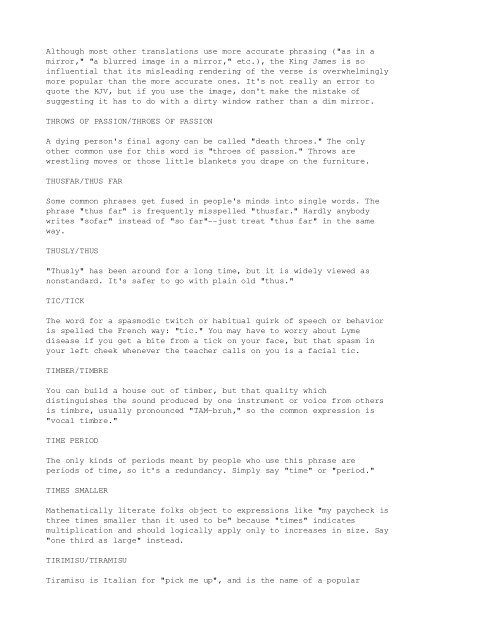Common_Errors_in_English_usage
Common_Errors_in_English_usage
Common_Errors_in_English_usage
You also want an ePaper? Increase the reach of your titles
YUMPU automatically turns print PDFs into web optimized ePapers that Google loves.
Although most other translations use more accurate phras<strong>in</strong>g ("as <strong>in</strong> a<br />
mirror," "a blurred image <strong>in</strong> a mirror," etc.), the K<strong>in</strong>g James is so<br />
<strong>in</strong>fluential that its mislead<strong>in</strong>g render<strong>in</strong>g of the verse is overwhelm<strong>in</strong>gly<br />
more popular than the more accurate ones. It's not really an error to<br />
quote the KJV, but if you use the image, don't make the mistake of<br />
suggest<strong>in</strong>g it has to do with a dirty w<strong>in</strong>dow rather than a dim mirror.<br />
THROWS OF PASSION/THROES OF PASSION<br />
A dy<strong>in</strong>g person's f<strong>in</strong>al agony can be called "death throes." The only<br />
other common use for this word is "throes of passion." Throws are<br />
wrestl<strong>in</strong>g moves or those little blankets you drape on the furniture.<br />
THUSFAR/THUS FAR<br />
Some common phrases get fused <strong>in</strong> people's m<strong>in</strong>ds <strong>in</strong>to s<strong>in</strong>gle words. The<br />
phrase "thus far" is frequently misspelled "thusfar." Hardly anybody<br />
writes "sofar" <strong>in</strong>stead of "so far"just treat "thus far" <strong>in</strong> the same<br />
way.<br />
THUSLY/THUS<br />
"Thusly" has been around for a long time, but it is widely viewed as<br />
nonstandard. It's safer to go with pla<strong>in</strong> old "thus."<br />
TIC/TICK<br />
The word for a spasmodic twitch or habitual quirk of speech or behavior<br />
is spelled the French way: "tic." You may have to worry about Lyme<br />
disease if you get a bite from a tick on your face, but that spasm <strong>in</strong><br />
your left cheek whenever the teacher calls on you is a facial tic.<br />
TIMBER/TIMBRE<br />
You can build a house out of timber, but that quality which<br />
dist<strong>in</strong>guishes the sound produced by one <strong>in</strong>strument or voice from others<br />
is timbre, usually pronounced "TAMbruh," so the common expression is<br />
"vocal timbre."<br />
TIME PERIOD<br />
The only k<strong>in</strong>ds of periods meant by people who use this phrase are<br />
periods of time, so it's a redundancy. Simply say "time" or "period."<br />
TIMES SMALLER<br />
Mathematically literate folks object to expressions like "my paycheck is<br />
three times smaller than it used to be" because "times" <strong>in</strong>dicates<br />
multiplication and should logically apply only to <strong>in</strong>creases <strong>in</strong> size. Say<br />
"one third as large" <strong>in</strong>stead.<br />
TIRIMISU/TIRAMISU<br />
Tiramisu is Italian for "pick me up", and is the name of a popular





